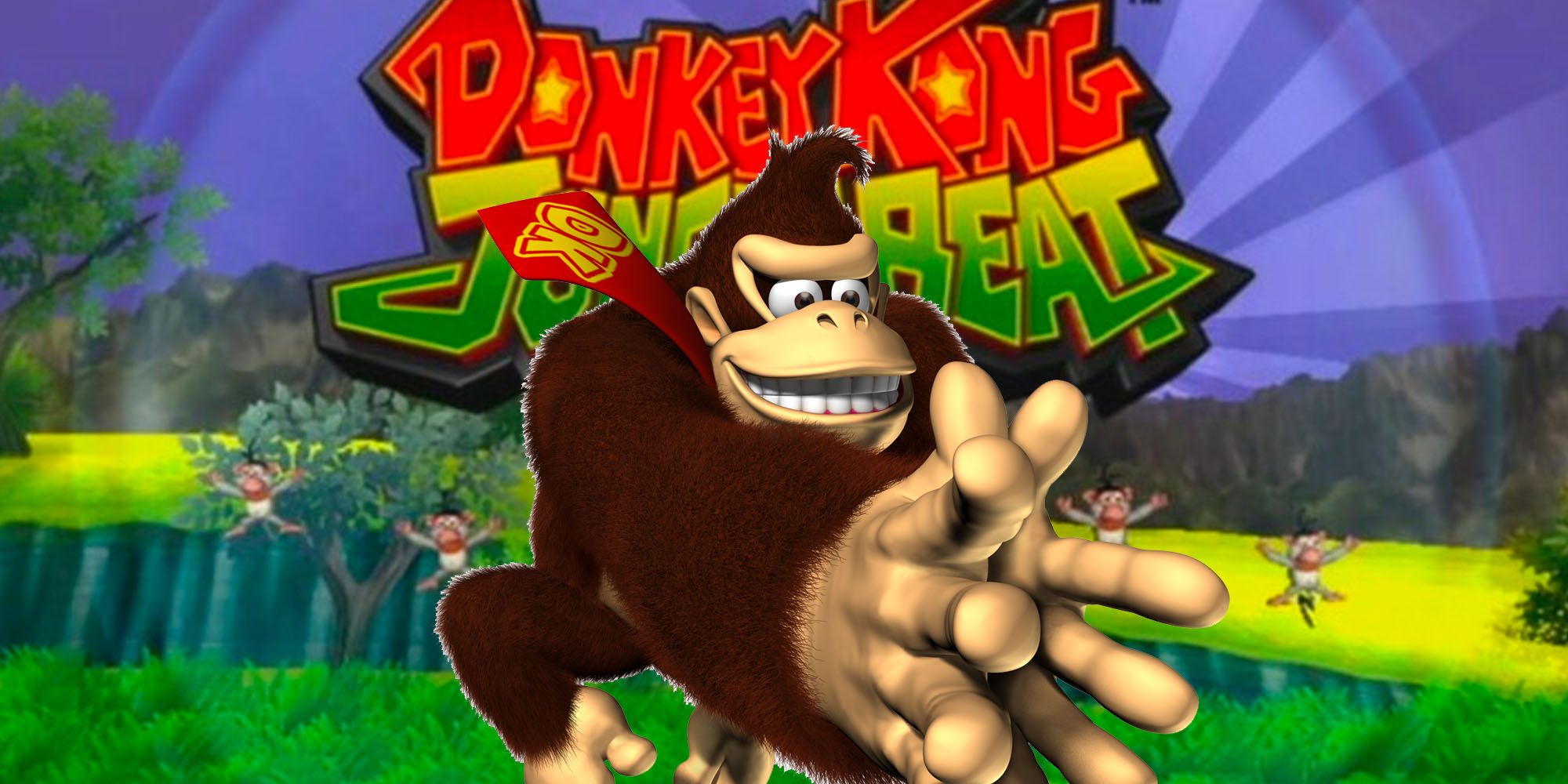For a number of reasons, Donkey Kong Jungle Beat stood out from other games upon its U.S. GameCube release in 2005. It had the distinction of being the only platformer to make use of the DK Bongos, previously used only for the Donkey Konga games. Jungle Beat was also the first game to ever receive an E10+ rating from the U.S. video game ratings board, the ESRB.
Unlike what its controller’s rhythm game roots might suggest, Jungle Beat did not necessitate players beat the Bongos in time with the soundtrack. Players simply tapped them to move DK left or right, hit both to jump, and clapped their hands above the Bongos to smack enemies between DK’s palms. Flurries of punches could also be delivered by quickly hitting the drums.
Click the button below to start this article in quick view.
According to the ESRB’s website, an E rating means a game is generally suitable for Everyone. E10+ means “the content is generally suitable for ages 10 and up, and may contain more cartoon, fantasy or mild violence, or minimal suggestive themes.” E10+ is therefore a medium between the E and T for Teen rating. While the E10+ rating wasn’t created for Jungle Beat specifically, the game is indicative of larger gaming trends circa 2005.
DK Bongos Could Be How Donkey Kong Jungle Beat Earned Its Rating
The DK Bongos are much more tactile than a controller. If the player claps to have DK squash a bat, DK’s hands make the exact same motion as the player’s. It’s reasonable to assume this direct correlation with the game’s on-screen violence may have garnered Donkey Kong Jungle Beat a little extra attention from the ESRB. However, the Wii version of the game, which eschewed the DK Bongos, was also rated E10+.
Jungle Beat is listed on the ESRB’s website as receiving its E10+ rating for “cartoon violence.” Ahead of the game’s release in 2005, the ESRB announced the creation of the new rating in a press release. The organization’s president commented on the changing atmosphere of gaming: “The content of computer and video games continues to advance in terms of sophistication, complexity and graphic quality. Given this evolution, the new E10+ rating category will provide consumers, particularly parents, with more precise guidance on the age appropriateness of certain titles, fulfilling our goal of helping ensure that the right games are selected for their children and families.” In short, Jungle Beat happened to be the first instance in a larger trend of gaming.
It appears the ESRB felt Jungle Beat’s violence exceeded that of a normal E game, but recognized increasing it to a T would be uncalled for. But what’s peculiar is that this play-style shift had been occurring for years, since 3D gaming started becoming more commonplace. The Legend of Zelda: Ocarina of Time, for instance, now has an E10+ for “animated blood, fantasy violence, and suggestive themes,” but upon its initial N64 release, it received an E rating with the simple mention of the existence of “violence.” It appears it took years for the ESRB to create their new rating. The E10+ press release, after all, cites that the ESRB consulted with “numerous child development experts and academicians.”
The ESRB also has a history of overreaction. Like Ocarina of Time, Twilight Princess is also listed as having “animated blood and fantasy violence” – but with no “suggestive themes.” Yet Twilight Princess is rated T for Teen, and the average recommended age by parental users of popular resource Common Sense Media at the time of writing is 9+, indicating that the ESRB’s rating may have been an elevated response to Twilight Princess’s darker themes. Similarly, Guitar Hero 5 has a T rating for “mild lyrics and mild suggestive themes.” The fact that two “mild” factors resulted in a T rating hints that there is perhaps more cultural pressure at play in some ratings than strictly an assessment of included content.
The ESRB’s reasoning for its ratings may occasionally feel a bit unclear, but the quality of Donkey Kong Jungle Beat is decidedly less contentious. The game received warm, positive reviews upon release and is fondly remembered by many.
Source: ESRB (2, 3, 4, 5), Common Sense Media
